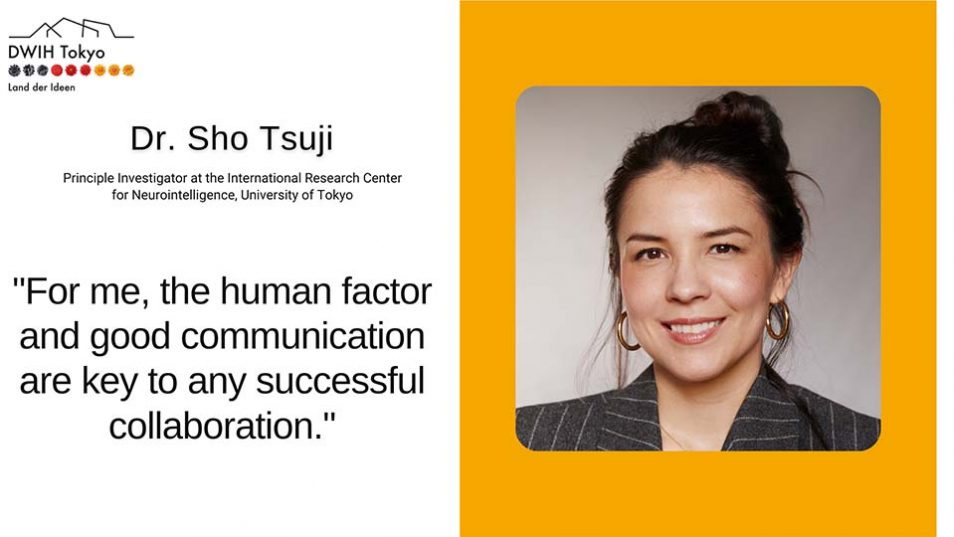Dr. Sho Tsuji
 © DWIH Tokyo / Dr. Sho Tsuji
© DWIH Tokyo / Dr. Sho Tsuji
Our series “Connecting East and West – A Short Interview with …“ presents people involved in German-Japanese research collaborations – and their insights on how and where to cooperate successfully!
This week, Dr. Sho Tsuji, Principle Investigator at the International Research Center for Neurointelligence, University of Tokyo, and an expert on developmental psychology and infant language acquisition, talks about her experiences working in Japan and Germany and delivers a passionate plea for researchers to reach out more!
1. What kind of research makes you excited, and why?
Developmental psychology studies developing infant cognition. Right now, the field of artificial intelligence is quite interested in how babies learn, and I find this perspective really exciting: If we were to build a machine that learns as well as a baby, what elements would need to be built in (nature) and what experiences would it need in order to learn (nurture)? Just to be clear: I don’t find it exciting because I am dreaming of baby bot, but because it helps to structure our thoughts and decide on research directions. Specifically, my line of research is concerned with the role of social interaction on babies’ learning. Thinking about how to construct a “social learning machine” pushes us to think about how to define “sociality” in formal and measurable terms, and in fact it really goes back to rethinking one of the core pillars of what makes us human.
2. What is your connection to Japan?
I have been based in Japan for the past two years and am part of two relatively new institutes at The University of Tokyo, the International Research Center for Neurointelligence and the Beyond AI Institute. But my connection goes way back. I have a very personal connection to Japan because my mother is Japanese (and she herself moved to Germany for research many years ago, actually), and I have visited Japan professionally throughout my career: As an exchange student during undergrad with a partnership between Humboldt University and The University of Tokyo, as a graduate exchange student with a German Academic Scholarship Foundation to RIKEN Center for Brain Sciences, and later with a CANON foundation in Europe fellowship to the same center later on.
3. Where should Japan and Germany cooperate more?
In the field of child development and especially language development, it is of utmost importance to have generalizable results that do not only concern children growing up in one culture. Japan and Germany are great candidates for comparison, since they have comparable socio-economic status but very distinct cultures and languages. In addition, both countries face similar demographic challenges like child poverty or access to medical infrastructure in rural areas, which could be counteracted by intervention programs and access to remote diagnostic and treatment alternatives.
4. What is your winning formula for research cooperation?
Collaborations become increasingly interdisciplinary and large-scale. For me, the human factor and good communication are key to any successful collaboration, and especially so in this changing collaboration landscape: Interdisciplinary approaches bring together researchers with completely different backgrounds and frames of thought. If they actually find a common language, it can lead to wonderful ideas – but reaching this common language is actually a whole endeavor in itself. With regard to the large-scale nature of collaborations, I have experienced how important it is to clearly delineate the roles and contributions of research members to make sure everyone’s contribution is valued.
5. What advice do you have for Japanese researchers looking for joint projects?
I would really want more Japanese researchers to reach out, even across language barriers. Now being based in Japan I visit (though mostly virtually…) national conferences and see a lot of great work that is not visible internationally. I am also experiencing more Japanese researchers reaching out to me now that I am in Japan. I would love for Japanese researchers to make their work more visible by publishing and presenting at conferences in English and also by reaching out actively to researchers abroad. I think I speak for many researchers if I say that I am always happy if someone is interested in my work and reaches out to me, and I couldn’t care less if the English isn’t perfect. So, please get in touch!
Dr. Sho Tsuji
- Principal Investigator & Assistant Professor, University of Tokyo, International Research Center for Neurointelligence (IRCN) and Beyond AI Institute
- Postdoctoral researcher, University of Pennsylvania and Laboratoire de Sciences Cognitives et Psycholinguistique (ENS, EHESS, CNRS)
- PhD in Psycholinguistics, International Max Planck Research School (IMPRS) for Language Sciences & Radboud University
- Visiting researcher, RIKEN Brain Sciences Institute, Laboratory for Language Development
- Diplom (MA equivalent) in Psychology, Humboldt University Berlin
Contact information:
To read other articles related to the DWIH Tokyo Interview, click here.
